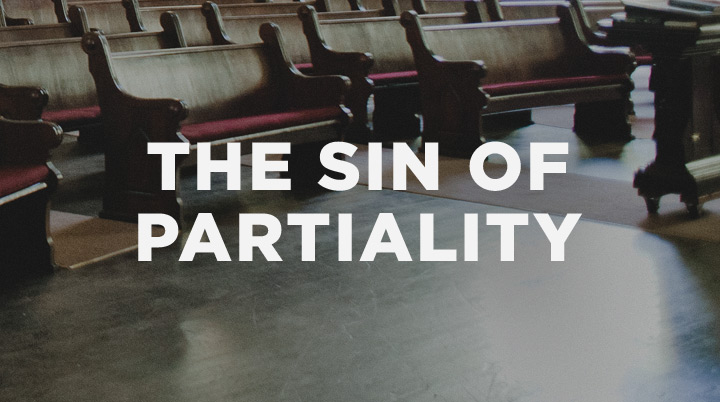Latest
-
Objections to the Christian Faith from the Unchurched and De-Churched
 Tue Dec 02, 2014
Tue Dec 02, 2014
by Resurgence -
Craig Groeschel: We Innovate for Jesus
 Tue Oct 14, 2014
Tue Oct 14, 2014
by Resurgence -
Mark Driscoll: Revelation
 Tue Oct 07, 2014
Tue Oct 07, 2014
by Resurgence -
RESURGENCE LEADERSHIP #034: JOHN PIPER, WHY I TRUST THE SCRIPTURES, PART 2
 Tue Sep 30, 2014
Tue Sep 30, 2014
by Resurgence -
Resurgence Leadership #033: John Piper, Why I Trust the Scriptures, Part 1
 Tue Sep 23, 2014
Tue Sep 23, 2014
by Resurgence

Archives
The Sin of Partiality

The Bible tells us not to give preference or privilege to the rich over the poor, but partiality can go both ways.
Rich people need pastors.
There is no doubt that the Bible provides special comfort, blessing, and hope for the poor. In ministering to the poor, however, we must not completely abandon those with means. Ironically, the book of James is often cited to justify such partiality:
For if a man wearing a gold ring and fine clothing comes into your assembly, and a poor man in shabby clothing also comes in, and if you pay attention to the one who wears the fine clothing and say, “You sit here in a good place,” while you say to the poor man, “You stand over there,” or, “Sit down at my feet,” have you not then made distinctions among yourselves and become judges with evil thoughts? (James 2:2–4)
The thrust of this passage is not that we should be anti-rich—it’s that we should be anti-partiality. In fact, James continues, “If you show partiality, you are committing sin and are convicted by the law as transgressors” (James 2:9).
In ministering to the poor, we must not completely abandon those with means.
But many Christians read these words and decide to hedge their bets by avoiding the wealthy altogether. Fear of committing the sin of partiality leads them to commit the sin of reverse partiality. Functionally, this results in a number of ways that we push the rich out of the church.
“The Rich Can’t Serve”?
When I first became a Christian, as a businessman, I didn’t think I could serve the church. My travel schedule made it hard to lead a small group or commit to a volunteer team, and my skill set didn’t seem to fit the ministry scene—I’m not a counselor or a preacher.
But then my pastor pointed out that giving is a spiritual gift (Rom. 12:8). I could give. A lot. But the thought never crossed my mind that I could serve by giving. Once I saw it as an act of service, it gave me great joy to give to the church.
Fear of committing the sin of partiality leads some Christians to commit the sin of reverse partiality.
“The Rich Can’t Be Pastored”?
When a pastor meets with someone who is poor or middle-class, we call it discipleship. When a pastor meets with someone who is rich, we call it partiality. This double standard leaves a portion of the church body without a shepherd, and these are men and women who often struggle mightily to find meaning and identity in Jesus rather than their possessions. It meant a great deal to me the first time my pastor sent me a text message to let me know he was praying for me.
“The Rich Can’t Be Saved”?
Our prejudices against the rich ultimately amount to poverty theology, as though our righteousness depends on Jesus plus how little is in our bank account.
Jesus did say that it is easier for a camel to go through the eye of a needle than for a rich person to enter the kingdom of God, which is to say impossible (Luke 18:25). But it’s no more impossible than it is for the rest of us. Jesus wasn’t saying that the rich are less likely to be saved than the poor; rather, that even for those whom his listeners thought had the best chances, salvation was impossible. But what is impossible with us is possible with God (Luke 18:27).
God saves the rich and the poor the exact same way—and it has nothing to do with how much money we have and everything to do with Christ’s perfect life, death, and resurrection on our behalf (Col. 3:11).
Jesus was saying that even for those whom his listeners thought had the best chances, salvation was impossible. But what is impossible with us is possible with God.
Repent and Invite
In truth, the rich have a lot to give to the church—and I’m not just talking money, although it’s time we stop minimizing the helpfulness of this resource as well.
Oftentimes, the rich possess other gifts typically devalued within the church: administration, leadership, management, and building systems and structures. I started serving the church as a large donor, and today God has called me to be an executive pastor, so you never know what those tithe checks are going to lead to.
Let’s repent of our bias against the rich, and invite them to be active members of the diverse body of Christ. For “God has so composed the body . . . that the members may have the same care for one another” (1 Cor. 12:24–25). We need each other—rich and poor alike.
Check out “James: Jesus’ Bold Little Brother,” a sermon series by Pastor Mark Driscoll